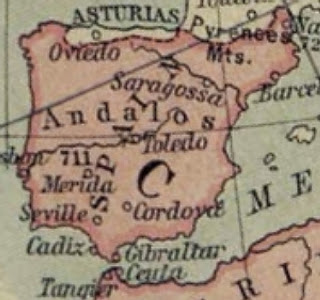Medieval History
 The great medieval Jewish poets of Spain are part and parcel of our Jewish heritage; names like Dunash ibn Labrat, Solomon ibn Gabirol, Moses ibn Ezra, Samuel Hanagid and Yehuda Halevi immediately come to mind. However, it comes as no surprise that all of them were men.
The great medieval Jewish poets of Spain are part and parcel of our Jewish heritage; names like Dunash ibn Labrat, Solomon ibn Gabirol, Moses ibn Ezra, Samuel Hanagid and Yehuda Halevi immediately come to mind. However, it comes as no surprise that all of them were men.
What is surprising is that during this period, there were numerous Muslim women whose poetry has been preserved. Although Muslims refer to the Jews as ahl al-kitab or ?people of the book,? Muslim women seem to have been more successful in creating lasting poetic works.
It is rather difficult to account for this discrepancy, for it seems odd to imagine that Muslim women in medieval Spain were far more educated than their Jewish counterparts. Arabic became the lingua franca following the Muslim conquest of the country in 711. When Jewish poets began to compose in Arabic and later in Hebrew, were the women entirely excluded? There are very few extant poems written by Jewish women dating to this period. Although only a fraction of all poems from that time have survived, this does not mean more were not written. The poems that are available are of a high quality, but the problem of quantity cannot be ignored.
Click here to read this article from the Jerusalem Post
- Medieval Painting Hints At Ties Between Blacks And Jews
The anonymous 16th-century painter who recorded a scene of everyday life at the king?s fountain (Chafariz d?El Rei) in Lisbon depicted an impressive range of people and animals. In addition to a swan, a seal, fish, horses, dogs and birds, the artist...
- Medieval Siddur Battles Gender Inequality Via Jewish Prayer
A siddur from 1471 has revealed an early example of egalitarian Jewish prayer, presenting historical attempts to battle gender inequality. According to the Jewish Theological Seminary (JTS), the 600-year-old siddur replaces the traditional prayer recited...
- Medieval Jewish Manuscripts Discovered In Afghanistan
Over 150 medieval Jewish documents have been discovered in Afghanistan. The works were found, purportedly by shepherds looking for sheep, in the mountains of Samangan province, which lies along the Silk Road trade route. The manuscripts were written in...
- William Brinner, Scholar Of Near Eastern Studies, Dies At 86
William ?Ze?ev? Brinner, a professor emeritus of Near Eastern studies at the University of California, Berkeley, who was known for his commitment to fostering understanding between Muslims and Jews, died at his Berkeley home on Feb. 3 after a lengthy...
- Cordoba: Name Debate Echoes An Old Clash Of Faiths
The great mosque of Córdoba was begun by the Muslim caliphs in the eighth century, its forest of pillars and red-and-white striped arches meant to convey a powerful sense of the infinite. With the Christian reconquest of Spain in the 13th century, it...
Medieval History
Two poets from medieval Spain

What is surprising is that during this period, there were numerous Muslim women whose poetry has been preserved. Although Muslims refer to the Jews as ahl al-kitab or ?people of the book,? Muslim women seem to have been more successful in creating lasting poetic works.
It is rather difficult to account for this discrepancy, for it seems odd to imagine that Muslim women in medieval Spain were far more educated than their Jewish counterparts. Arabic became the lingua franca following the Muslim conquest of the country in 711. When Jewish poets began to compose in Arabic and later in Hebrew, were the women entirely excluded? There are very few extant poems written by Jewish women dating to this period. Although only a fraction of all poems from that time have survived, this does not mean more were not written. The poems that are available are of a high quality, but the problem of quantity cannot be ignored.
Click here to read this article from the Jerusalem Post
- Medieval Painting Hints At Ties Between Blacks And Jews
The anonymous 16th-century painter who recorded a scene of everyday life at the king?s fountain (Chafariz d?El Rei) in Lisbon depicted an impressive range of people and animals. In addition to a swan, a seal, fish, horses, dogs and birds, the artist...
- Medieval Siddur Battles Gender Inequality Via Jewish Prayer
A siddur from 1471 has revealed an early example of egalitarian Jewish prayer, presenting historical attempts to battle gender inequality. According to the Jewish Theological Seminary (JTS), the 600-year-old siddur replaces the traditional prayer recited...
- Medieval Jewish Manuscripts Discovered In Afghanistan
Over 150 medieval Jewish documents have been discovered in Afghanistan. The works were found, purportedly by shepherds looking for sheep, in the mountains of Samangan province, which lies along the Silk Road trade route. The manuscripts were written in...
- William Brinner, Scholar Of Near Eastern Studies, Dies At 86
William ?Ze?ev? Brinner, a professor emeritus of Near Eastern studies at the University of California, Berkeley, who was known for his commitment to fostering understanding between Muslims and Jews, died at his Berkeley home on Feb. 3 after a lengthy...
- Cordoba: Name Debate Echoes An Old Clash Of Faiths
The great mosque of Córdoba was begun by the Muslim caliphs in the eighth century, its forest of pillars and red-and-white striped arches meant to convey a powerful sense of the infinite. With the Christian reconquest of Spain in the 13th century, it...
